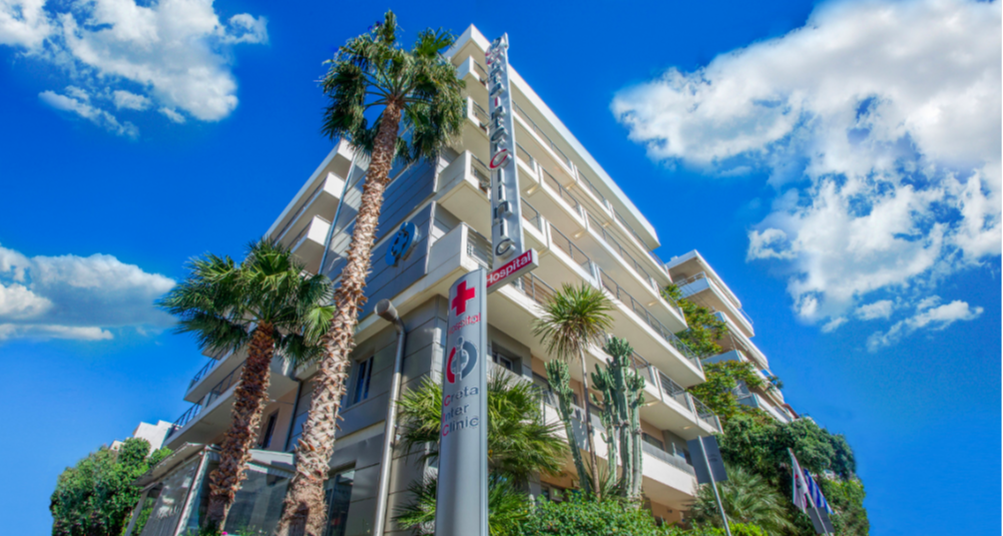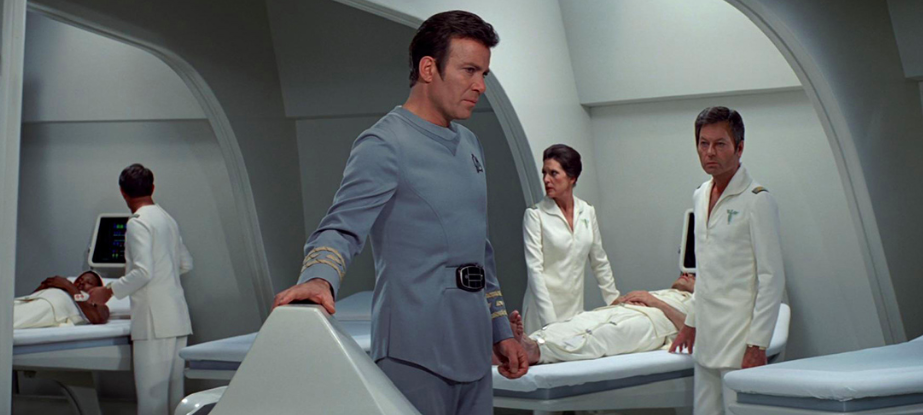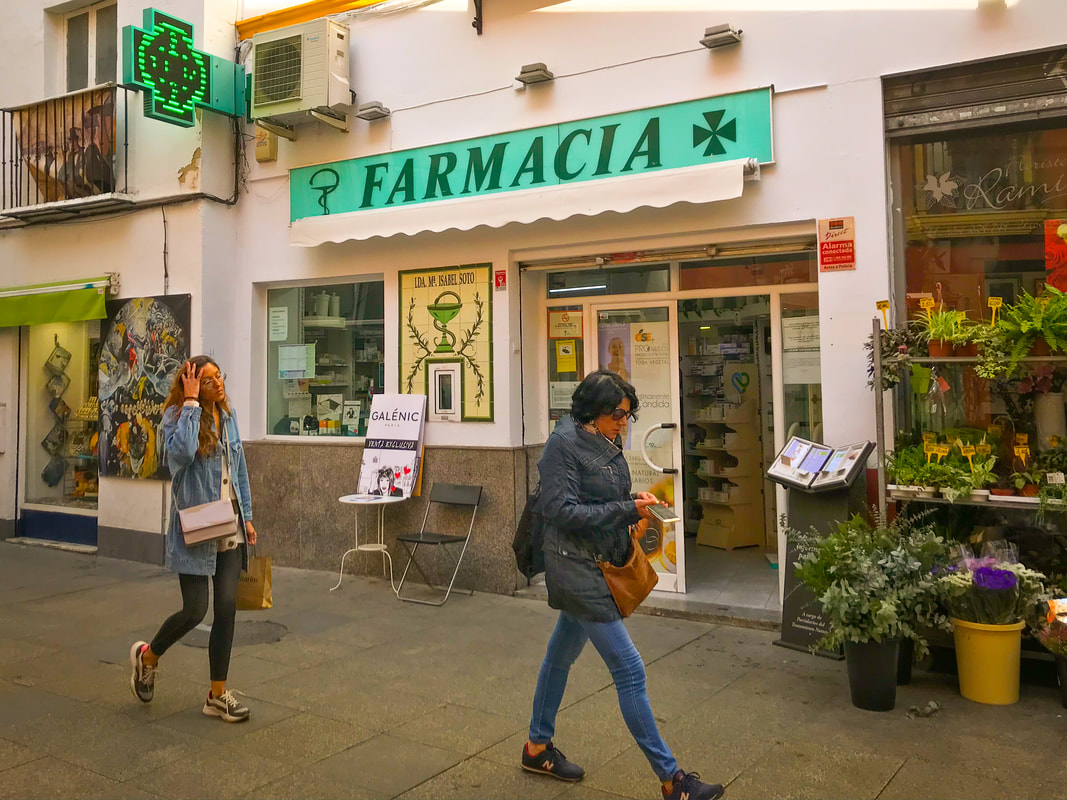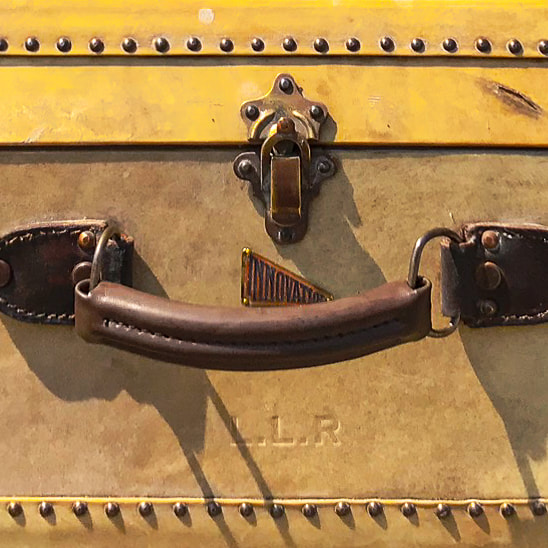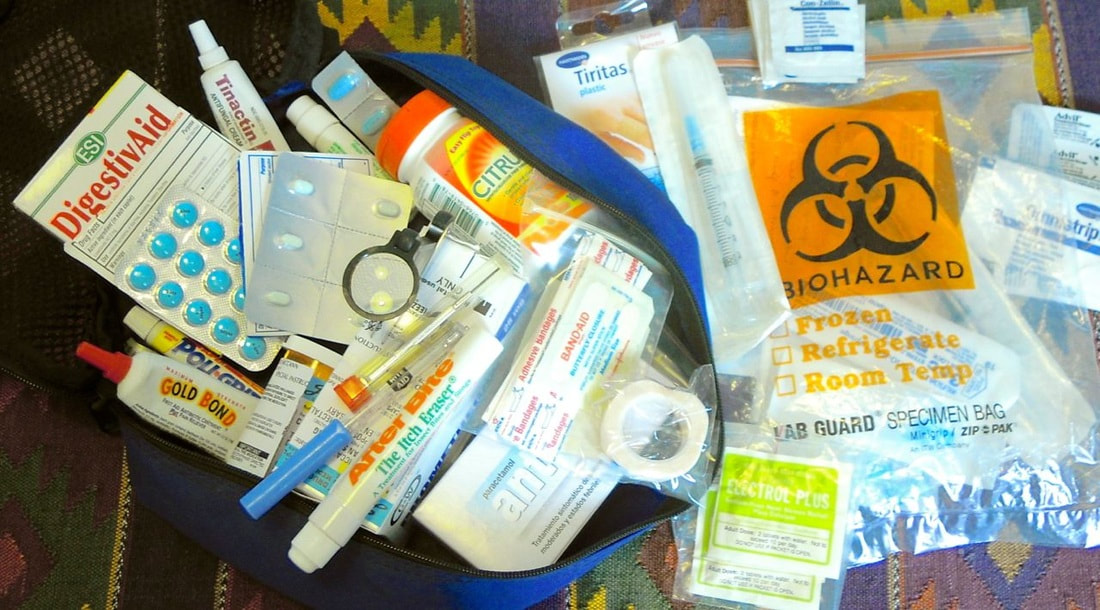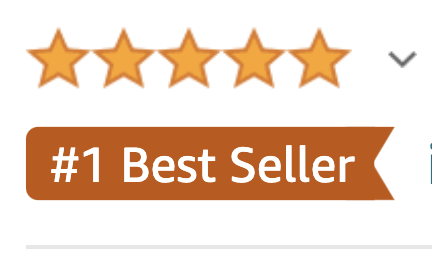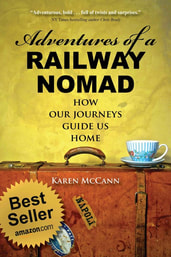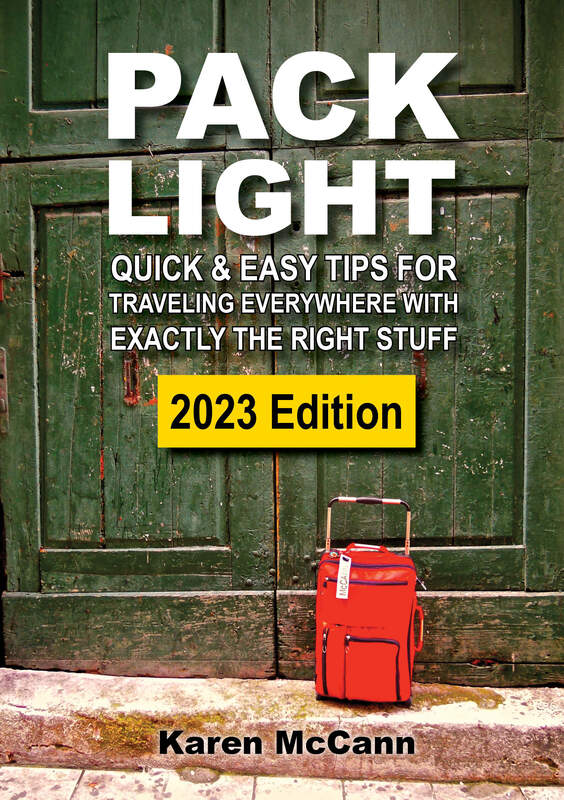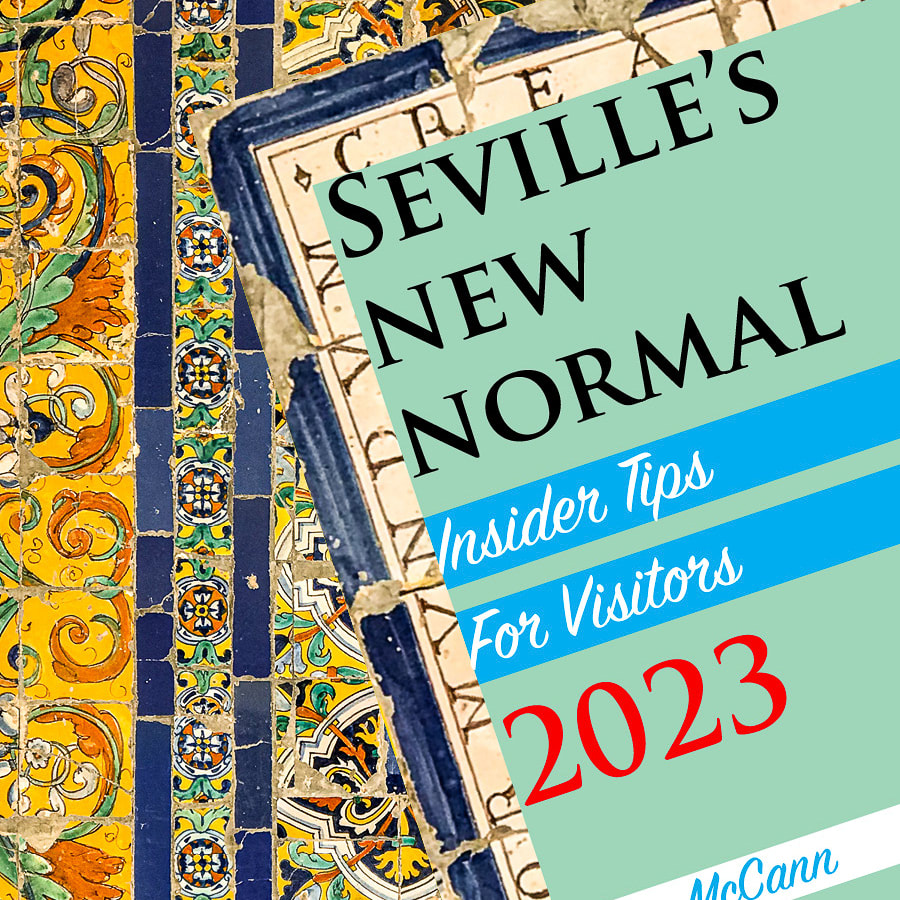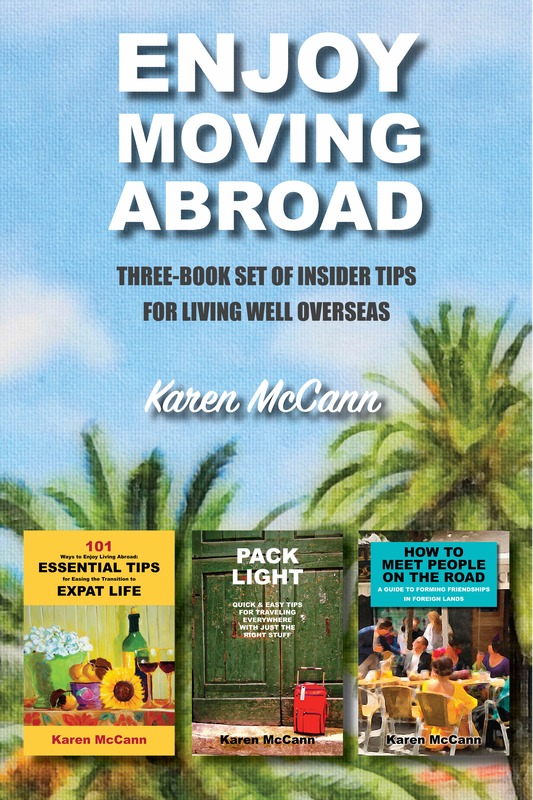|
Show of hands: how many of you actually like going to the dentist? Anyone? I certainly don’t. In fact, I pretty much need a shot of novocaine just to call and make the appointment, especially if I’m trying out a new dental practice. And that goes double in a foreign country. I’m such a coward that until now, I’ve always managed to be in America when it was time for dental maintenance. But last week, seriously overdue a cleaning, I gritted my teeth and booked an appointment with a Seville dentist. He came highly recommended by a friend, who mentioned — in some detail — his vivid good looks and luxurious hair. No, sorry, I don’t have any photos to share. You’ll just have to use your imagination. But the really striking thing about my visit to his dental practice was how efficient and painless everything was. If you’ve ever suffered through x-rays taken via a series of uncomfortable vinyl-clad carboard inserts jammed into your cheeks, you’ll appreciate that I simply rested my chin on a support and the machine rotated around me like something out of Star Trek. The cleaning was all done via water pressure, without a single jab to the gums with a sharp metal implement. Before I knew it I was back out on the street with a brighter smile and a couple of complimentary bamboo toothbrushes. It’s natural to be nervous about health care in a foreign country, and you're wise to be cautious, do your research, and seek the best available care. With a bit of luck, you just might find yourself pleasantly surprised by the whole experience. For instance, last April, just before starting our five-month Mediterranean Comfort Food Tour, Rich underwent a very minor medical procedure and was told to have the dressings changed, by health professionals, every other day for the next month. Our first stop was a clinic in Heraklion, Crete. Having emailed ahead to discuss his case — and his willingness to pay full price in cash — Rich was greeted with considerable enthusiasm. He was whisked to the head of the line and a neurosurgeon was summoned to change the bandage. It was all very gratifying, and the care could not have been better. Eventually Rich decided to try the free public health facilities, which turned out to be equally as clean, professional, and competent. And did I mention they were free? Two weeks ago here in Seville, I dropped in to see an 87-year-old friend and found her fretting about an earache. I walked five blocks to the nearest public health center and made an appointment for later that same day. The doctor — thanks to the universal medical records system — had my friend’s full history at his fingertips. Unlike the US, they don’t make you undress and get into a paper gown every time you visit, nor do they send in a nurse to take all your vitals. The doctor determines what body parts need to be examined and focuses on those. In this case, he peered into my friend’s ear and checked her blood pressure, which has been problematic in the past, but was OK now. He tapped a few keys on his computer and told me he’d prescribed a mild pain killer. When I asked what pharmacy he’d sent the prescription to, he looked at me strangely. “All of them,” he said. You’ve got to love the efficiency! Not being a Spanish citizen, I don’t qualify for the public medical system and I’m required to have private health insurance. Rich and I pay 2,600€ ($2845) a year for outpatient coverage for both of us with Sanitas, a private carrier geared to expats. We get unlimited office visits and (brace yourself) house calls. And they reimburse us for 80% of any costs we incur — for instance, those fees from the private clinics in Crete. My Sanitas insurance doesn’t cover prescriptions, but that’s OK because the meds I take are affordable here. For example, in the US a 90-day supply of thyroid tablets retails for $132; my drug benefits reduce it to $9.93. In Spain I pay just 3.85€ ($4.21) for the same Merck pharmaceuticals. This insurance doesn’t cover dental either, but like the meds, these services are reasonably priced. I paid 50€ ($55) for x-rays and teeth cleaning; in the US those services typically run $200 to $300. I’ve read that in Los Angeles, these services can cost up to $3,800; I can only assume that to justify those prices, the cleanings are done by actor Ed Helms, reprising his role as Stu the Dentist in the movie Hangover.
Sometimes our concerns about foreign medical care make us do extraordinarily foolish things. When an American nurse I know got food poisoning in England, she insisted on immediately flying back to the US rather than getting treatment from local providers. I don’t even want to imagine what that flight was like for her, her husband, or anyone else in the vicinity.
Why would she put herself through that kind of suffering? Because she believed the American health care industry, which has spent billions of dollars trying to convince us that they provide the only decent medical care on the planet. And that any health services outside our borders will be so medieval we’ll wind up with something worse than whatever we walked in with. None of that is true. The World Health Organization’s 2020 rankings place the quality of healthcare in the US at number 37 — well below, for instance, France (1), Spain (7), Greece (14), Columbia (22), and Morocco (29). Yes, below Morocco, folks! The UK is ranked a healthy 18, suggesting my friend could have received better care there than in her own country. 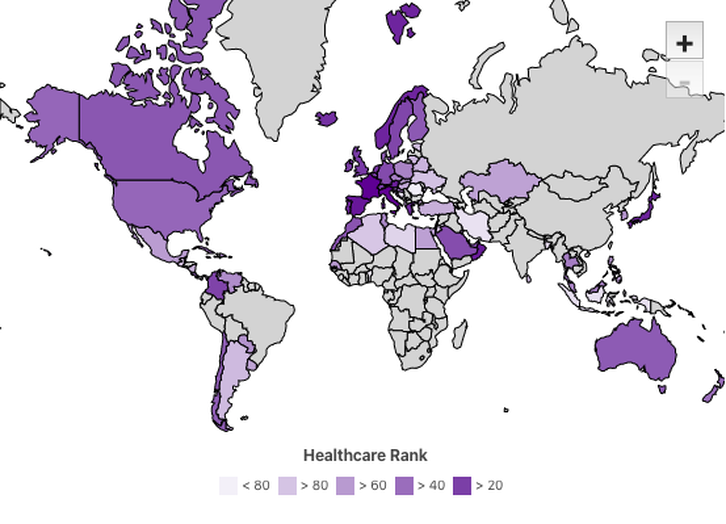
The World Health Organization ranked countries by the care process (preventative care measures, safe care, coordinated care, and engagement and patient preferences), access (affordability and timeliness), administrative efficiency, equity, and healthcare outcomes (population health, mortality amenable to healthcare, and disease-specific health outcomes).
Of course, for major issues, flying home may prove sensible. It’s easier to navigate a known medical system, with familiar doctors who speak your language and specialize in precisely what ails you. And if you’re traveling in a poor, rural region known for substandard medical care, you'll want to head to the nearest city. But most of the time, our health issues can be dealt with locally. Rich’s legendary first aid kit is our first line of defense, a visit to the pharmacy comes next, and, if necessary, we research local clinics online. You can also check with the nearest US embassy or consulate; they often have lists of English-speaking doctors. Sadly, not all providers have been as handsome as my dentist — indeed, many look more like Elmer Fudd or Margaret Thatcher — but they’ve all proved to be competent professionals who took good care of us in our hour of need. Journalist Bill Moyars once said, “When I learn something new — and it happens every day — I feel a little more at home in this universe, a little more comfortable in the nest.” The more I learn about healthcare in other countries, the less anxious I feel about what would happen if I got sick on the road, and the more comfortable I am about moving freely around the world. YOU MIGHT ALSO ENJOY
19 Comments
2/11/2020 06:58:52 pm
Karen,
Reply
Karen McCann
2/12/2020 05:14:33 pm
Living abroad is great, Tricia, especially in countries with excellent health care such as Portugal and Spain. Like you, I get a lot of questions about how "safe" the healthcare system is. It's great to be able to reassure them that the standards here are higher than what they are use to at home!
Reply
Susan Mellsopp
2/11/2020 08:23:41 pm
Fabulous blog post. Those of us who live in countries where health care is free and for me any type of accident is covered by ACC we always have to wonder why Americans think their health system is so good. They have no idea!
Reply
Karen McCann
2/12/2020 05:18:31 pm
Americans really don't have any idea what it's like to live completely free from worrying about the cost of healthcare or the risk of a single accident or illness wiping out your life savings. There are many great things about American medicine, but the financial aspect isn't one of them.
Reply
Shéa
2/11/2020 09:04:34 pm
I lived in the UK for 6 years ago. The differences are night and day. I never realized how much stress you’re under every day in the US, knowing you’re one event away from financial devastation even WITH insurance. I know there are many countries with better healthcare.
Reply
Caroline Van Antwerp
2/12/2020 03:20:55 pm
Having lived and worked (my husband and I) in many different countries since 1985, I can heartily concur with blogpost re medical care. However, when it comes to mental health care, that is the same knotty problem as in the US.
Reply
Shéa
2/12/2020 07:43:40 pm
Thanks for your insight, Caroline. Did you ever find a workaround? Or did you just have to go without? How did you manage?
Karen McCann
2/12/2020 05:26:00 pm
Shéa, mental health treatment is always complex, as Caroline points out in her comment. It varies considerably from country to country, and within the US, from state to state. And everywhere funding for mental health care tends to lag far behind that for physical health care. I assume you've talked with your medical doctor and state offices? I wish I had an inside track on how to get good treatment but I'm afraid this isn't my area of expertise.
Reply
Shéa
2/12/2020 07:41:22 pm
Thanks for your thoughtful input Caroline and Karen.
Karen McCann
2/13/2020 08:24:41 am
Shéa, clearly there are many factors you and your partner need to consider. I can speak to one: the language barrier. I don't know where your partner wants to live, but I can tell you that here in Seville, it's very difficult to find any mental health professionals who speak English. I've lived here nearly 15 years and I know of one bi-lingual therapist. Depending on the kind of treatment and support he needs, it might be very difficult to find people with whom your partner can communicate. As I mentioned previously, this isn't my area of expertise, so hopefully you can find someone who's more familiar with mental health care overseas to give you more concrete info.
Reply
Mary Wilson
2/12/2020 03:02:10 am
Really helpful post. I travel a good bit and never worry. Do you often buy evacuation insurance if needed?
Reply
Karen McCann
2/12/2020 05:27:16 pm
We sometimes buy evacuation insurance for specific trips, if we're heading into remote rural areas we'd be nervous about getting treated in. I always consider a peace-of-mind expenditure.
Reply
Faye
2/12/2020 04:27:33 am
So glad U wrote this article. As it happens, I had lunch w/ book club ladies last week. We soon got to subject of healthcare(big election issue)
Reply
Karen McCann
2/12/2020 05:35:18 pm
Faye, I'm guessing the people objecting to public health systems like Spain's have never experienced it. Yes, there are trade-offs; you might have to wait longer for elective surgeries, for example. But as my Spanish friends frequently point out, on the plus side you live your entire life knowing you'll always get the care you need, and you don't have to fear that a single accident or disease will send you into bankruptcy and homelessness. I wish those people in your book club could come talk to my Spanish friends about whether that trade-off is worth it!
Reply
Some of the best - and cheapest - medical and dental care I've received is abroad. In fact, the other day when a friend was railing on about how she'd never let a foreign dentist near her mouth, I told her that when I need my teeth cleaned, I wait until I'm in Thailand! :-)
Reply
Karen McCann
2/12/2020 05:47:03 pm
That's great to hear, Nora! I haven't tried Thailand's dentistry yet, but it's now on my list. I feel sorry that fear-mongering has left so many people too scared to try things that are so ordinary. Thanks for sharing this tip.
Reply
Faye
2/14/2020 04:37:04 am
While there are many excellent therapists here in u.s.. unfortunately, Medicare and insurance companys determine the outcome of the therapy, unless client can pay indepentantly of insurance to have ongoing therapy.
Reply
3/21/2022 11:20:59 am
Consider using specialist multipurpose cleaning products with hospital-grade disinfectants to achieve the best results in a healthcare setting. Multipurpose goods let you get the job done right the first time. Keep track of all high-touch surfaces in the office, such as cupboards, counters, doorknobs, computer keyboards, sinks, bedrails, doors, chairs, and light switches, using a checklist. Always make sure these surfaces are cleaned thoroughly and consistently. Every employee should be guided and watched to ensure that they are following the cleaning checklist's standards.
Reply
2/3/2023 05:40:07 pm
Awesome content. Keep doing something as informative as this. Will recommend and share this!
Reply
Leave a Reply. |
This blog is a promotion-free zone.
As my regular readers know, I never get free or discounted goods or services for mentioning anything on this blog (or anywhere else). I only write about things I find interesting and/or useful. I'm an American travel writer living in California and Seville, Spain. I travel the world seeking eccentric people, quirky places, and outrageously delicious food so I can have the fun of writing about them here.
My current project is OUT TO LUNCH IN SAN FRANCISCO. Don't miss out! SIGN UP HERE to be notified when I publish new posts. Planning a trip?
Use the search box below to find out about other places I've written about. Winner of the 2023 Firebird Book Award for Travel
#1 Amazon Bestseller in Tourist Destinations, Travel Tips, Gastronomy Essays, and Senior Travel
BLOG ARCHIVES
July 2024
CATEGORIES
All
|
